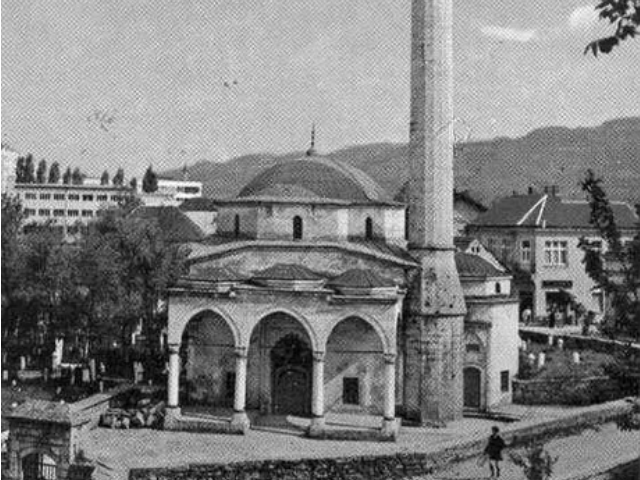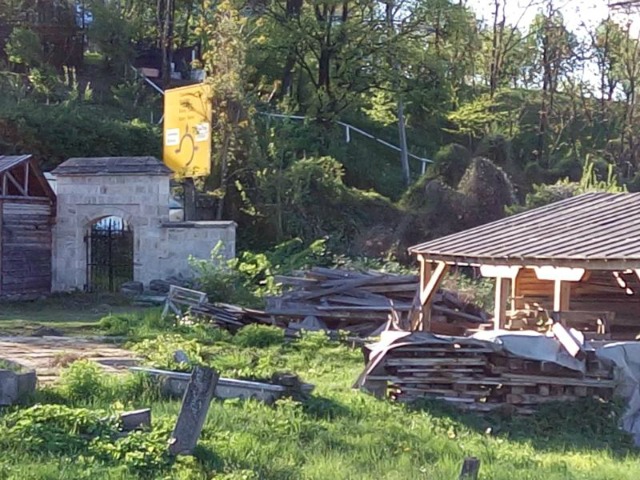Bosnian Muslims Rebuild Historic War-Ruined Mosque
- Published in
- Category: LATEST NEWS
by Danijel Kovacevic, BIRN, Banja Luka
The reconstruction of a 16th Century Ottoman-era mosque, the last of 15 that were destroyed during the 1992-95 war in the Bosnian Serbs’ main city of Banja Luka, is finally ready to start.
For years, fragments of the demolished Arnaudija mosque were patiently collected from garbage dumps around Banja Luka, the administrative centre of Bosnia’s Serb-dominated Republika Srpska entity, and from the nearby Vrbas river.

The fragments have now been now cleaned, prepared and transported to the site where a new mosque will be built on the foundations of the old one, identical in appearance to the one that was destroyed by Serb forces during the war in May 1993.
The Islamic Community, the organisation representing Muslims in Banja Luka, said that everything is ready for April 22, when it intends to lay the foundation stone. The reconstruction will begin immediately after that.
“The preparations for the ceremony of laying the foundation stone are coming to an end, and the ceremony will be attended by a large number of believers as well as representatives of political and religious life of Bosnia and Herzegovina and the Republic of Turkey,” Senaid Zajimovic, a director of the Waqf Directorate of the Islamic Community of Bosnia and Herzegovina, told BIRN.
The funds for the reconstruction are being provided by the Turkish Directorate General of Waqf Foundations; waqf is an Islamic charitable endowment.
The project follows the grand reopening last May of the historic Ottoman-era Ferhadija mosque in Banja Luka, which was also demolished by Serb forces during wartime.
“The renovation of the Arnaudija mosque is very specific, since in addition to the mosque, there are plenty of other facilities which are to be restored. Since the finances for its rebuilding are fully secured, we believe that its renewal will progress much faster than the reconstruction of Ferhadija,” Zajimovic said.
The entire reconstruction project will cost between four and five million Bosnian marks (between two and 2.5 million euros), according to Zajimovic.

“We will not rush, I think that finances will not be a problem, but considering that this is [a project of] the highest category, we will not mind if it takes a year or two; it is essential that this is done well,” said the mufti of Banja Luka, Osman Effendi Kozlic.
Of the 15 mosques destroyed in Banja Luka during the war, the Arnaudija is the last to be rebuilt.
“All the others are under construction or will soon be completed and officially opened,” Kozlic said.
The Arnaudija was originally built in 1595, close to the Ferhadija. Both mosques were under the protection of UNESCO until the war but were both razed to the ground on the same day - May 7, 1993.
The Ferhadija was rebuilt and reopened on May 7, 2016, 23 years after it was destroyed.
Bosnia’s top leaders and international dignitaries including Turkey’s then Prime Minister Ahmet Davutoglu joined some 8,000 visitors who gathered for the reopening of the mosque, which was one of the landmarks of Banja Luka for centuries before it was leveled.
The Arnaudija was built in built in classical Ottoman style by Hasan Defterdar, finance minister of the Eyalet of Bosnia, an administrative division of the Ottoman Empire, according to historians.
Its reconstruction will be done in an identical manner to that of the Ferhadija.
Mirsad Beharic, who spends most of his afternoons in the yard of the mosque, said that it was an integral part of the Banja Luka landscape.
“The centre was the Ferhadija and then there were shops and stores around, the Hastahana hospital, and the Arnaudija at the end of the street,” Beharic said.
Zajimovic said that the reconstruction of the Ferhadija and the Arnaudija is significant because it is “evidence that people are turning towards coexistence and helping each other”.
“These are monuments of great importance for Banja Luka, Republika Srpska and Bosnia and Herzegovina. It is in the interests of all of us to restore the monuments for which Bosnia and Herzegovina has been known in the world, and to connect people and nations [ethnicities] in the region,” Zajimovic said.
